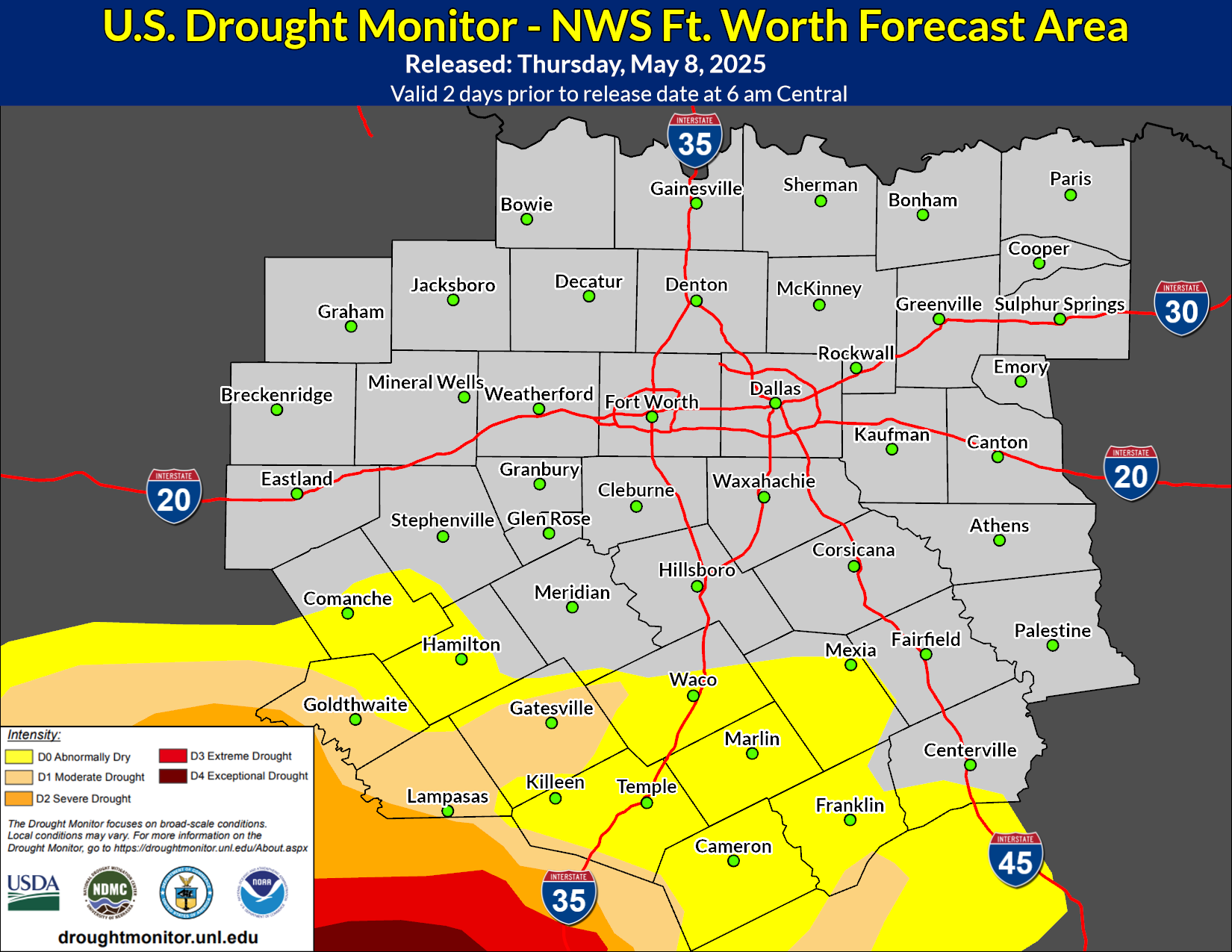Throughout the summer of 2023, the National Weather Service has been issuing Excessive Heat Warnings and Heat Advisories for Denton County. The Dallas-Fort Worth region has experienced 47 days with 100+ degree days.
“While there is no official definition of a heatwave, we often categorize extended periods of triple-digit temperatures, particularly 105 F+ days, as constituting a heatwave in North Texas,” Daniel Huckaby, a meteorologist with the National Weather Service Fort Worth office (NWS), said.
Currently, the 2023 summer and the 2022 summer are tied for being the sixth warmest summer ever recorded. Due to these high temperatures, drought conditions have settled in for the past months, making 2023 the 11th driest year on record since records began.
“Drought has been in place in the Argyle area since April. The severity of the drought has intensified this summer,” Huckaby said.
The last measurable rainfall in Argyle was July 16. Currently, Argyle is in extreme drought, along with neighboring towns like Northlake, Justin, Ponder, and Roanoke. Due to drought conditions, the threat of grass fires has increased. Due to this threat, Denton County implemented a burn ban on July 25, 2023, banning fires for untreated lumber, yard trimmings, or other outdoor fire activities.
“The continued population growth in our area, coupled with the hot and dry summers of 2022 and 2023, has led to high water usage, particularly for outdoor watering, and placing a great strain on the infrastructure,” Blake Alldredge, Water Education Coordinator with the Upper Trinity Regional Water District (UTRWD), said.
The Upper Trinity Regional Water District provides water and wastewater treatment to all of Denton County and some parts of Collin and Dallas Counties. On June 28, 2022 the Upper Trinity Regional Water District implemented stage one restrictions of its Drought Contingency Plan.
“If water usage patterns continue, along with continued population growth, Upper Trinity may need to move to Stage 2 of its Drought Contingency Plan, which would limit watering to one day per week, or to Stage 3, which would prohibit outdoor watering altogether,” Alldredge said.
On August 18, 2023, the UTRWD released a warning to residents to conserve water. If residents do not start conserving more the water district will be forced to move to stage two of the Drought Contingency Plan.
“Upper Trinity felt that it was best to leave Stage 1 in place throughout the winter and spring in anticipation of another hot, dry summer and knowing that there will be even more residents living here than in 2022,” Alldredge said.
Currently, the UTRWD uses three reservoirs including Lewisville Lake, Ray Roberts Lake, Jim Chapman Lake, and in the future Lake Ralph Hall, all of which serve water to residents. All reservoirs are currently at acceptable levels, but due to high water usage for outdoor watering and the last dry summer, the reservoirs are draining quickly. Lake Lewisville is the most affected reservoir, with only 84.5% at capacity.
“Because of some milder weather next week, we’ll likely fall short of the hottest summer on record [Summer of 2011], but we may be close to it,” Huckaby said.
The Dallas Fort Worth region is expected to

get a break from triple-digit temperatures as it moves into September, but water restrictions continue to be enforced.
“During the summer months, water usage doubles or triples as many residents run their sprinklers often,” Alldredge said.
According to the UTRWD, Outdoor watering accounted for an estimated 50-70% of water usage during the summer months, with a majority going to irrigating lawns. The Upper Trinity Regional Water District has provided information on how to do your part to conserve water.
“The best way for the public to save water is to limit outdoor watering to no more than two days per week and to only water between 6 pm and 10 am. Residents should also only water on days set by their city or utility,” Alldredge said.
Some recommendations from these groups on how to conserve water are to have smart-water irrigation systems, like installing a smart controller and rain sensor, using drip-line irrigation, repairing sprinkler systems, and following official information, like watering twice a week, before 10 A.M. and after 6 P.M, and signing up for watering information from WaterMyYard.org.
“Upper Trinity has a Water Wise Garden at its Lewisville campus to demonstrate different styles of gardens that use less water than typical landscape plants used in North Texas,” Alldredge said.
Another way is by participating in water-wise gardening. This can be done by using drought-tolerant plants, plants naturalized to Texas, or utilizing Texas native plants.
“If everyone limits their outdoor watering to two days each week, we can manage flows into and out of the treatment plants and reduce the strain on the pumps in our water system,” Alldredge said.




